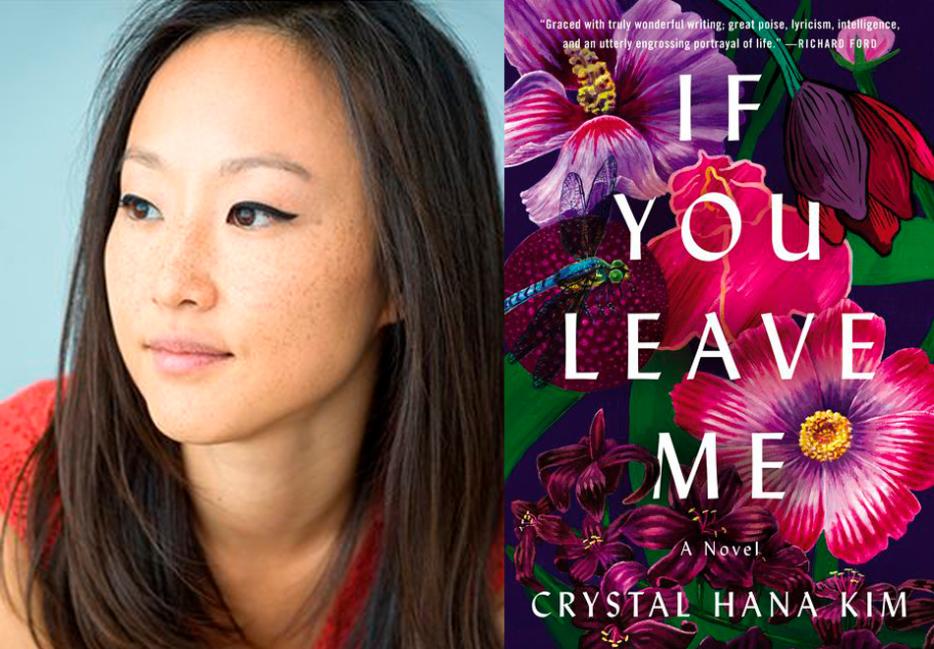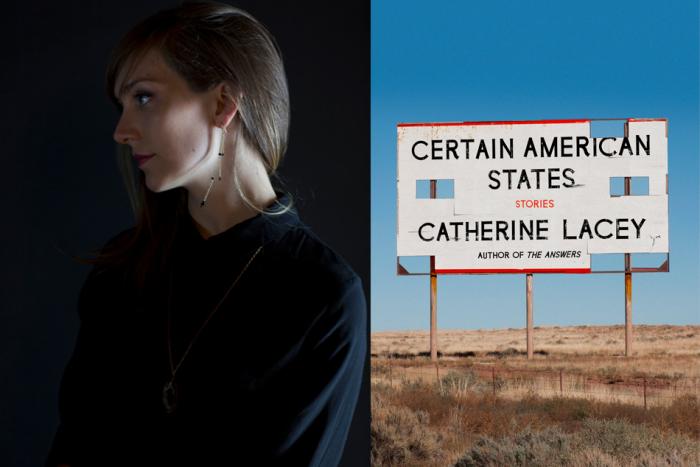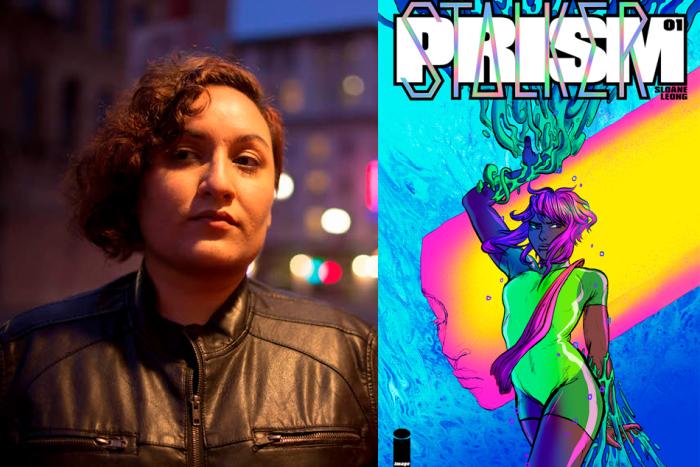In Crystal Hana Kim’s debut novel If You Leave Me (William Morrow), sixteen-year-old refugee Haemi Lee finds herself caught between the affections of two men: Kyunghwan, her first love, and Jisoo, his wealthier cousin. She eventually marries Jisoo, sacrificing a life with Kyunghwan for what she believes will be the safety and security of her family—a choice that sows seeds of deep unhappiness not just for her, but for future generations. If You Leave Me is a powerful and timely story about the personal cost of survival—the cost to relationships; the cost to families; the cost for generations to come—as well as a vivid, beautifully rendered portrait of love, sacrifice, and tragedy in a country torn asunder by war.
The book began as overlapping character-driven stories, and Kim gives all her main characters a voice: Haemi, Jisoo, and Kyunghwan take turns narrating throughout, along with Haemi’s brother Hyunki and, later, her daughter Solee. The agility with which these rich, distinctive voices interweave is one of many strengths in a book that never flags despite its heavy subject matter.
Kim says she wanted to consider the effects of inherited trauma by telling the story of a spirited, complicated woman constrained by war and time and circumstance. For Kim, who grew up hearing stories about the Korean War from her family members, in particular her grandmother, the novel grew in part out of a desire to fill in gaps in her own understanding. “When I start writing, it’s nearly always because I am curious about something and want to learn more,” she says. “When writing this book, I wanted to know more about this war that is such a big part of my family’s history.”
Nicole Chung: The Korean War and its realities are deep in the marrow of this book, and we follow the characters beyond it. Why did you want to write about this particular era of Korean history and its aftermath?
Crystal Hana Kim: It’s so interesting that it’s a timely story right now, because when I began writing it—and even when it went out on submission to publishers—a story about the Korean War didn’t seem as timely. It’s such a big part of Korean identity, and it is still ongoing. But I didn’t realize how little people in this country knew about it; about America’s involvement; about North and South Korea and the fact that they have been two separate countries for less than 100 years. I was so surprised to find that many people here didn’t know all these facts when I talked to them about it.
Both my parents are Korean. My mom, who is the only one in her family who lives in America, is one of five daughters; the rest of the family is in Korea and we visit them often. So the war is something I grew up hearing a lot of stories about—which I think has not been the experience for some Korean Americans I know. Many people are hesitant to talk about the war and the trauma they experienced. But my grandmother is a storyteller, and she told me a lot of her stories.
The war is part of our history, and I knew a little about it, but I wanted to understand it more fully. And I understand best through writing.
“Solee,” a version of one of the chapters in this novel, was published as a short story by The Southern Review and then selected as one of PEN America’s 2017 Best Debut Short Stories. I loved that story when I first read it, and ever since I have been so eager to read this book. Can you talk a little about the evolution of the book, from interconnected stories about this family to the final novel? Where did it really begin for you?
When I was an undergrad, I was writing a lot of stories about teenagers and young girls. I came up with this character, Solee—she might have had a different name at the time, but I focused on her because I wanted a way to write about and explore mother/daughter dynamics.
Then, when I started my MFA, I really thought I wanted to write a collection of interconnected short stories. The idea of writing a novel was so daunting to me, and I thought connected stories might be more feasible. Solee was one of the first characters I created, and by writing her I realized I was interested in the character of her mother. I wanted to figure out her story, so I wrote a chapter from her perspective, and that led me to other characters. I just kept following my own curiosity about these different people; I didn’t quite know who they were yet. I knew they lived in Korea, but wasn’t sure when.
At the time I was also talking a lot with my grandmother, trying to think about larger themes and ideas, and I knew I loved hearing her stories. I decided to write about the Korean War in order to understand it more deeply. I’m so interested in exploring family and this idea of generational trauma. So I started with Haemi, the main character, writing her life and her journey beginning with her teenaged years as a refugee. By then I knew her very well as a character, and I knew what her perspective would be.
I felt so deeply for Haemi, I would’ve read about her forever. She seemed so strong in the beginning, and even later, in the depths of her unhappiness, she never quite felt like a victim to me. It was difficult but also powerful to read about this strong woman who cannot have what she wants—or even necessarily feel sure of what she wants all the time—because her life is so much about survival.
I’m so glad you didn’t think Haemi seemed like a victim. It was really important to me to write a strong female character. I grew up around strong Korean women. My mom is one of five sisters, all very strong in their own ways, though they all have very different temperaments. My grandmother has always been very strong—my grandparents divorced, which is unusual in Korea, and I grew up hearing my mom tell stories about how my grandmother had to work hard to provide for the family, because my grandfather wasn’t really providing any financial support. She was a single woman running a hotel, raising five children. One time when I was young, I asked her how come she wasn’t like all the other halmeonis I saw when I visited Korea, and she said, “It’s because I have to make money!”
Can you talk more about Haemi, and some of the challenges of writing a strong character whose options are so limited because of the time and place she lives in? She’s so smart and determined—you want her to have so many more choices than she does. She has to flee with her mother and brother to a refugee camp. She tries to seize some happiness for herself, but doesn’t get to keep the man she loves. She gets backed into this very hard decision, trading love for what she thinks will be security for her family, and by then the choice feels inevitable.
I really wanted this book to feel realistic. Haemi is a character with an impoverished background. She doesn’t have a high school education—that was common for a lot of people back then. She’s also a refugee, living in a country at war, so she is going to be very limited in her choices. So I wanted her to make choices and not be a victim, but also, as you say, she can’t help but be constrained in those choices. She needed to be a realistic person given the time period.
That said, sometimes I felt it was important to push back against people’s perceptions of women in different time periods. Once I workshopped a chapter about Haemi, and one of the comments was: “I don’t know that a woman of this time would have these sexual desires.” And I just remember thinking, “What?” I wanted people to understand that women in these circumstances would have the same desires, the same wants, maybe some of the same ambivalence about becoming a mother that many women today experience.
I wanted to make Haemi a woman who struggles with motherhood because the cost of survival was so high for her. And that is something her children will notice. Because they’re young, they can’t always articulate it, but they know that something is wrong. At the same time, they also have this kind of unreserved love for her.
I thought it was so well done, the way you explored the far-reaching consequences of Haemi’s choice to marry Jisoo and how her resulting unhappiness—and that generational trauma you mentioned before—echoes through the lives of her children. Can you talk a little about that, and also how you wrote the relationship between Haemi and her daughter Solee?
I really wanted to write about Haemi and her daughter, and spend time exploring that relationship, because I have always been interested in mother/daughter stories. To me, growing up, my mom always seemed like someone who was louder and more outspoken than a lot of the Korean women I saw when I visited Korea, and I was always very curious about that. My mother and I have a good relationship, but you know, the mother/daughter relationship can just be so complicated. It’s something I have thought and written about for so long. I want to be a mother one day; I grew up around all these strong women; I also have a younger sister—these relationships between women are fascinating to me.
What sort of research did you have to do to write this book?
Oh, it was so much more than I thought when I started writing! I was mostly following my writerly whims in grad school, and I didn’t realize how much research would be involved. But then I realized my workshopmates didn’t know much about the Korean war, and that would be true of many of my readers, so I needed to provide a lot more background information. And also I just wanted to read and understand more for myself. So I read a lot of historical and political texts about the Korean War. I interviewed my grandmother. I interviewed some of my dad’s siblings, who were alive during the war. I watched documentaries and movies. And I also looked at a lot of photographs, to get a sense of what everyday life was like for people at the time. I wanted to create a visual and sensory experience for the reader, especially because I knew it might be a foreign place for them.
What was the most surprising thing you learned in your research?
One thing that was surprising but shouldn’t have been was just how difficult it was to find accounts of women’s experiences during and after the war. That was hard and frustrating. I had to get creative with my research, because I was specifically interested in women’s lives during the war, and there was not much information. So I read a lot of sociological studies about women and war and trauma.
And let’s see...one of the more interesting things I learned was that, in the years after the war, there were a lot of government campaigns to promote smaller families. They actually had a van go around and provide free IUDs to people. I’m so curious about what those were even like, and how effective they were.
Sometimes I wonder if we’re finally seeing more Korean and Korean American stories because of South Korea’s increased cultural influence. In more cynical moments, I think our country is also fascinated by North Korean suffering. Did you feel any additional pressure writing a book set during and after the Korean War for a largely non-Korean audience?
When I started writing this, I was really just driven by my interest and my own need to write it. I felt like it was something I had to do. I wasn’t thinking about any readers in particular. But later on, when I had a draft I was revising and I was starting to think beyond the characters, I did start to think about that kind of pressure. I had a conversation about the book with my parents and my uncle, and showed them all of these photos I had gathered over the years. My uncle made a comment like, “Make sure you represent us well and make Koreans proud, show us in a good light.”
Wow, that’s so much.
It is! I didn’t know how to articulate to them that that’s not my role as a writer. I’m not trying to represent all of Korea. I want to write these characters who have particular experiences. Though I think it’s wonderful if the American reader, or English-speaking reader, learns more about the Korean War or thinks more about what one woman’s experience during that time might have been.
So what’s been your family’s reaction since you finished the novel? Have any of them read it.
They are all so excited for me. My parents can read English, and they speak English, but it would be hard for them to read a whole novel in English. They’re not going to be able to read this book easily. So they’re hoping it’ll get translated into Korean, and I really hope it will, too. They joked that if it doesn’t, they’ll read one line a day, and it’ll take them the rest of their lives. My mom has been trying to read the essays I’ve written, like the recent one about my grandmother.
I really loved that essay. In it, you wrote about the realization that you are more than your own self—your body, your bones, as you put it—you are also your family, and what they lived through. What are some things you learned about your family while talking with them for this book? And did any of their stories come into the novel, or just influence it in some surprising way?
I learned a lot more about my grandmother when I interviewed her. Working on this novel also allowed me to hear more stories from my parents. My dad is kind of a silent guy ... but nowadays he talks more and shares more stories.
When I started this book, I asked a lot of questions about his childhood, and he’d give such interesting tidbits. When he was little, the kids would go around chasing grasshoppers. They’d pluck their wings, and fry and eat them. They’d catch tadpoles and fish and eat those, too. It was because they were hungry, and it was protein, but as a child he didn’t think about that; he thought it was fun. He also told me about living near a woman whose child was half-white, and there was all this discrimination against them; that’s something I remembered, and wanted to include in my book. And my father vividly remembers the candy and cookies American soldiers would give out. So many of his memories rotated around food, because they didn’t have enough.
His life is so different now. Before, I hadn’t consciously thought about just how different it is. Growing up, I didn’t think about my parents being that poor or hungry—I mean I knew, but I just couldn’t imagine it fully. Writing this book helped me to ask more questions about them, about my family, and I became closer to them because I listened to their stories.
Have you started to hear from readers? Any reactions that have really meant a lot to you?
I’ve heard from readers who’ve said I’m portraying a really complicated woman who they did not hate in the end, even though they didn’t always agree with her. And I’m happy to hear that—I really wanted to write about someone complicated, and have people care for her. I’m really excited to hear from Korean American readers.
I didn’t grow up reading Korean American authors, and now I read every one I can find. I feel like it’s been kind of a banner year for Asian American women writers in particular. Is that something you’ve noticed, too?
Yes, and I’m so excited! This is a big year for Asian women writers. I also didn’t grow up reading many Asian women writers, or Asian American writers in general, but I think it’s something I desperately wanted. I distinctly remember when I was in Kindergarten, I picked up this book about a Chinese adoptee just because it had a girl like me on the cover. I really wanted to read more books about Asian characters, more books by Asian writers. And maybe that’s represented in the years I spent in college writing these white or raceless characters because I didn’t want to write Asian characters—I just hadn’t read about many growing up, and so I thought that wasn’t literature. I’m so happy and proud about all the Asian American women writing today. It fills me with such joy.
Do you think you’ll write more stories set in Korea, during this time period or a different one?
I think so, yes. I started working on a novel, and it is half in America, present-day, and half in Korea in the ’80s. Earlier I mentioned being surprised by the amount of research that went into If You Leave Me, but I did enjoy that process, and how informed I felt creating the world of the book. So I think I will keep doing research and writing about Korea. I’m also eager to write about Korean Americans—who knows, it’s early and could still change, but with the second book, I’m trying to do both.






